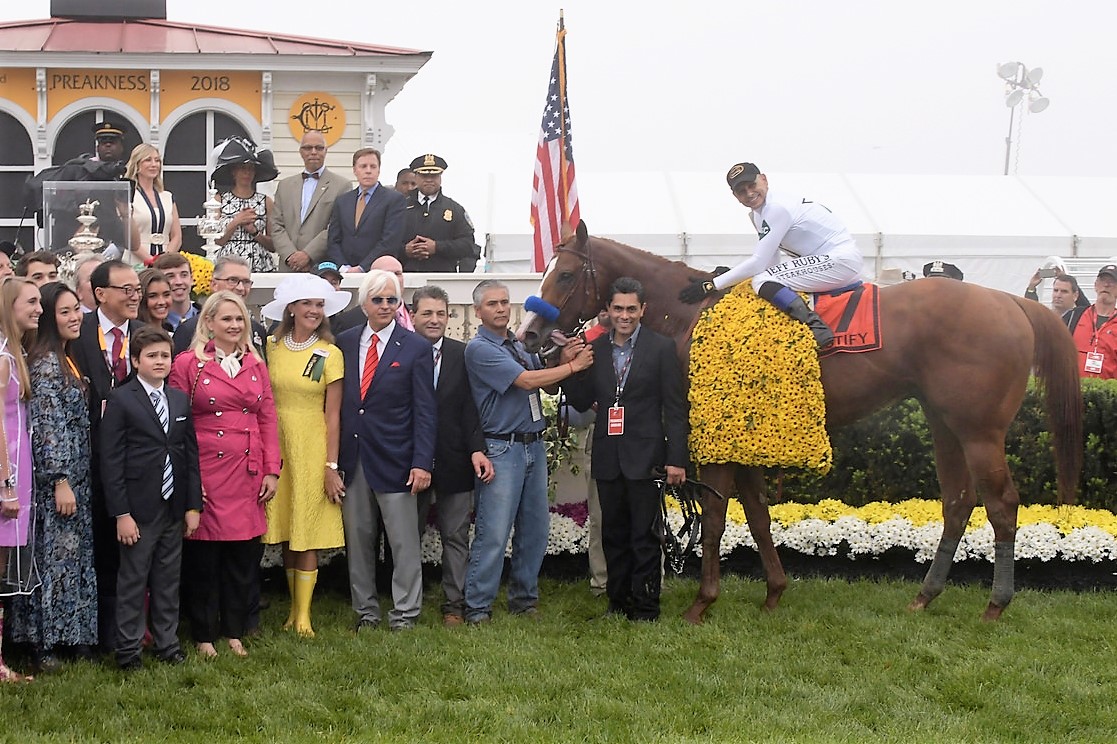“April is the cruelest month,” T.S. Eliot began his poem “The Waste Land.” But T.S. — we hesitate to be overly familiar and call him Tom — what about May?
Threats to and from Iran, the continuing abortion divide, tariff wars, the stock market bouncing around like a knuckleball again: The only thing that is certain these days is, of course, uncertainty, making us all uneasy.
In the past, culture — specifically, arts and entertainment and sports — has provided stability in a destabilized world. But the real world keeps intruding on these parallel worlds that are framed differently by time and space.
On Saturday, horse racing fans will gather for the second leg of the Triple Crown, the Preakness Stakes, with trainer Bob Baffert’s Improbable the favorite and War of Will right up there. But the biggest news is about a two-legged creature, Maximum Security owner Gary West, who’ll be interviewed during the race coverage. You’ll remember that his horse was disqualified after he and jockey Luis Saez veered in the final turn, interfering with other horses and nearly causing a pileup on their way to a brief victory. West is suing the Derby, Saez is fighting a suspension and the story just won’t go away.
Now West is challenging the owners of Country House (the declared winner), and War of Will, Long Range Toddy and Bodexpress, the affected Derby horses, saying he will give $5 million to any one of them who can get past Max next time they race. (Max and Country House are both out of the Preakness with injuries and a cold respectively.) Could this go all the way to the Supreme Court? Meanwhile, you had to chuckle at The New Yorker’s “The Kentucky Derby, As Told by the Horses”. I’m sure the horses find the whole thing ridiculous.
Then in Another Country Heard From Department, tennis land, there is trouble afoot on the men’s tour, with the forced resignation of Association of Tennis Professionals board member Justin Gimelstob, resulting from battery charges, but not before he was portrayed teaming with Novak Djokovic, president of the ATP Player Council, to oust ATP CEO Chris Kermode. I can’t speak to the dynamics of the situation but suffice it to say that some are laying the blame at the nimble feet of Djokovic, as a less than transparent president of the council in which his is merely one of 10 equal votes.
“I'm not the president of ATP,” he told The New York Times’ Ben Rothenberg. “I understand you want to get information from me. I can give you some information. Some information I'm just not in that privileged position to give you, or I can, but then it's not fair towards president of ATP or board members that are supposed to also communicate.”
Unfortunately, when you’re the president, people target you rightly or wrongly, because, well, you’re the president. Goes with the territory, Nole. But in fairness, it may be that Djokovic is trying to maintain a discretion he lacked early in his career — and that is so lacking on the world stage today, as we have daily proof.
Certainly, discretion is not the better part of valor with bad boy Nick Kyrgios, who was disqualified at the Italian Open after throwing a chair and walking out of a match but not before he took potshots at Rafael Nadal for being a sore loser and Djokovic for trying too hard to be liked. There may be truth in Kyrgios’ observations, but dude, why are you always punching above your weight class?
We get it: The young guns like to challenge the alphas. And you may be able to beat the best on occasion. But you still have a long way to go to be the best.
